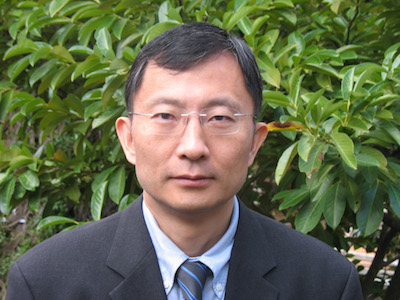 Dr. Huajian Gao is seeking to initiate collaborations with the Department of Mechanical Engineering as a Faculty Fellow in the 2017 class of the Hagler Institute for Advanced Study at Texas A&M University.
Dr. Huajian Gao is seeking to initiate collaborations with the Department of Mechanical Engineering as a Faculty Fellow in the 2017 class of the Hagler Institute for Advanced Study at Texas A&M University.
“I’m hoping I can gain a foothold here to have some collaborations long term,” Gao said. “The people here are very nice and the university is growing fast. I came from Brown University, and we are a smaller engineering school. Here I think Texas A&M can offer a much wider spectrum of people and talents.”
Gao, the Walter H. Annenberg Professor of Engineering at Brown, joined the Institute in 2017 for a three-year appointment, which is a mechanism for attracting world-class talent to the university and is driven by nominations of National Academy and Nobel-prize caliber researchers. Each year the Hagler Institute invites a number of nationally and internationally prominent faculty fellows to pursue advanced study in collaboration with faculty and student scholars at Texas A&M. The goal is to provide an environment for research and scholarship with the faculty fellows having freedom to pursue their own research interests as well as collaborate in disciplinary and multidisciplinary research.
“I think the Institute is very unique. It allows you to get in touch with top-notch scientists from all over the world,” Gao said. “These are top-notch scientists in their fields, so (Texas A&M) is able to recruit these scientists, at least on a visiting instance. I’m very impressed with the university. Before I came here, I didn’t know much about Texas A&M, but now through the Hagler Institute, I am very impressed.”
Gao’s field of study is nanomechanics, where he looks at the mechanical properties and behavior of materials on a small scale. He has a number of projects ranging from high-strength, high-ductility and high-toughness materials to biological systems including how nanoscale materials interact with human and animal cells.
Gao earned his bachelor’s degree in solid mechanics from China’s Xi’an Jiaotong University in 1982, followed by a master’s degree in 1984 and a doctorate in 1988, both in engineering science, from Harvard University. He has been interested in pursuing engineering since he was a child hearing about his father’s work as an electrical engineer.
He is a member of the National Academy of Engineering, as well as a member of the German National Academy of Sciences and a foreign member of the Chinese Academy of Sciences. He is a fellow of the American Society of Mechanical Engineering and the Institute of Physics in Great Britain. Among his honors, Gao has received the American Society of Mechanical Engineers’ George Wallace Melville Medal, Robert Henry Thurston Lecture Award, Charles Russ Richards Memorial Award and the Nadai Medal; the American Society of Civil Engineers’ Theodor von Karman Medal; the Max Planck Society’s Research Innovation Award; the Alexander von Humboldt Research Award; the International Union of Theoretical and Applied Mechanics’ Rodney Hill Prize in Solid Mechanics; and the Society of Engineering Science’s William Prager Medal.